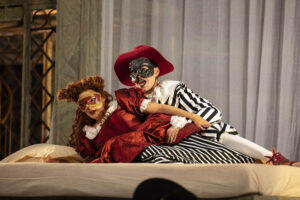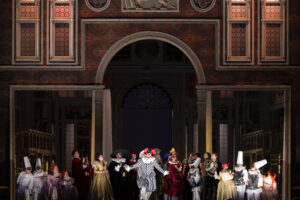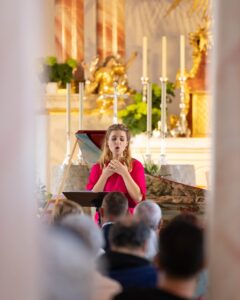While wandering around Venice, Goethe arrived at a conclusion that surprised even him, namely, that the artist’s eye is formed by the colours of the reality he has experienced since childhood. In Goethe’s opinion, the Venetians perceive everything in brighter colours than the residents of northern Europe, who are consigned to dust and mud, and incapable of such a joyful vision of the world.
Similar reflections occurred to me as I spent a few days at this year’s Bayreuth Baroque festival, of which the leading figure was Francesco Cavalli, a composer born in 1602 and inseparably linked to the beginnings of the Venetian school of opera, as the most highly esteemed and most influential composer of works written with the city’s public opera theatres in mind. Although he entered the world in Crema, Lombardy, and was first taught by his father, Giovanni Battista Caletti, his beautiful soprano voice captured the attention of the Venetian aristocrat Federico Cavalli, who undertook to educate him and bestowed his own surname on the boy. The 14-year-old Francesco became a singer in the choir of St Mark’s Basilica and may have been trained with Monteverdi, who was kapellmeister there at the time. That is not known for sure, but what is certain is that in 1638, now a grown man, he began working with the newly opened Teatro San Cassiano and a year later wrote for the theatre Le nozze di Teti e di Peleo – his first ‘opera scenica’, and at the same time the oldest extant Venetian opera.
From that moment on, he composed at least 40 operas. It is quite astonishing to note how many have come down to us: contemporary scholars confirm his authorship of 27 operatic scores. Even more remarkably, his works began circulating around theatres in other Italian cities already in the mid-seventeenth century. All of them are marked by a smooth-flowing narrative, specific cantabilità, or 'singability’ of passionate recitatives intertwined with emotional arias, and a rare dramatic flair. Major–minor tonality is still crystallising in this music, which contains plenty of dissonances and large intervallic leaps. Yet one also notes the cohesion between the music and the diverse range of characters, which break up the gravity of situations with elements of comedy and grotesque, like in Shakespeare’s plays. Tragic heroes rub shoulders on the stage with types from commedia dell’arte, lofty myths clash with the vox populi, and the woes and ecstasies of lovers with Venetian street opinion.
Pompeo Magno. Sophie Junker (Giulia) and Valer Sabadus (Servilio). Photo: Clemens Manser
For the festival’s premiere, Max Emanuel Cenčić chose a late opera by Cavalli – the heroic drama Pompeo Magno (1666), the last part of the so-called ‘republican’ trilogy, also comprising the operas Scipione affricano and Muzio Scevola. All three were written after the composer’s return from France, where he spent more than two years, invited to the court of Louis XIV by Cardinal Mazarini. After the fiasco of the imposing five-act tragedy L’Ercole amante, written for the inauguration of the Salle des Machines in Paris in 1662, Cavalli solemnly vowed never to write another opera in his life. That vow was short lived. The Venetian premiere of Scipione took place in 1664, at the Teatro Santi Giovanni e Paolo, while the other two works were staged in consecutive years at the Teatro di San Salvador. The libretti for the entire trilogy were written by Nicolò Minato, an incredibly productive poet who was fascinated by historical subjects. That does not alter the fact that he treated the sources for the biography of Pompey – especially Plutarch’s Parallel Lives – with a veritably Venetian insouciance. Perhaps the only thing that tallies with the Greek historian’s account is the commander’s triumphant entrance into Rome following the victorious third war against Mithridates. The rest is a tangle of amorous intrigue as implausible as it is passionate, with occasionally sarcastic satire on the political reality of La Serenissima at the time. A satire that is tragic, but as per usual peopled by a host of comical figures, enhanced by Cavalli’s traumatic experiences from Paris, which nevertheless triggered his Italian imagination, with plenty of virtuosic arias, considerably more elaborate than in the works from the beginnings of his Venetian career.
After several excellent premieres in recent years, Cenčić has finally found the perfect blend. He has directed a show in which he neither encloses the work in a cage of soulless reconstruction nor forces it to meet the expectations of a modern audience. He has produced a staging in the colours of a reality remembered from childhood – in the renewed spirit of theatre propounded by Jean-Louis Martinoty, who opened our eyes to the mechanism of Baroque opera back in the 70s. It is not entirely true that one of the last operas by Cavalli has only been revived in our times at the Margravial Opera House. At the beginning of the 70s, in a version far-removed from the original, Raymond Leppard presented it at Glyndebourne. In 1975 the BBC broadcast Pompeo Magno from London, in a performance conducted by Denis Stevens, with Paul Esswood in the titular role and Nigel Rogers as Mithridates. But it is only with Cenčić that we receive this masterwork in a form that gives viewers the illusion of travelling back in time to the true sources of the phenomenon of Venetian opera, into a world seen joyfully, though not without a hint of invigorating bitterness.
A huge contribution to this production’s success was also made by Cenčić’s collaborators: Helmut Stürmer, who created sets referring to the architecture of the Palace of the Doges (openwork windows, a bas relief of a winged lion, a geometrical pattern in rose marble against a backdrop of bright limestone), which were alternately covered and uncovered, as required, to expand or restrict the narrative field; Corina Gramosteanu, who created the wonderful costumes, inspired by the works of Venetian painters, from Bernardo Strozzi through to Giandomenico Tiepolo; the large team responsible for the wigs, masks and make-up; and the lightning director Léo Petrequin, endowed with a rare imagination, who bathed the whole scene in illumination worthy of the Venetian colourists.
Cenčić the stage director breathed life into it all. Cenčić the singer forged, with his warm, velvety countertenor, a deeply human titular hero, now amusing, now ambiguous, now genuinely moving. It is impossible today to identify all the performers of the world premiere of Pompeo in 1666; it is not known how many women were in the cast, how many castrati, how many boys or how many men. All told, eight countertenors took part in the shows at Bayreuth, including the phenomenal Nicolò Balducci in the part of Sesto, Pompeo’s son: an artist for whom I already predict a marvellous career in heroic roles written with soprano castratos in mind. It is with pleasure that I noted the festival debut of Alois Mühlbacher in the dual role of Amore and Farnace; although he took a while to get going, it was worth the wait for his supple and surprisingly boyish soprano countertenor to reach its full sound. Valer Sabadus in the part of Servilio rather paled in comparison. Kacper Szelążek – unrecognisable in the grotesque costume of Arpalia – displayed not just excellent vocal technique, but also fabulous acting skills. A special mention in this procession of countertenors is due to 70-year-old Dominique Visse, in the role of the lascivious (though not always up to the task) Delfo. This legendary singer formed a hugely comical pair with Marcel Beekman, a Dutch haute-contre at least a head taller, who gave a bravura performance as the libidinous old Gypsy Atrea.
Pompeo Magno. The final scene. Photo: Clemens Manser
It is hard to decide which of the female voices made the biggest impression on me: the fiery soprano Mariana Flores in the part of Issicratea, brimming with emotion and at times frightfully distinctive, or her extreme opposite – the exquisite, splendidly rounded voice of Sophie Junker, whose only flaw was that she had decidedly too little to sing in the part of Giulia. Valerio Contaldo, blessed with a lyric tenor voice with a beautiful golden timbre, full and sonorous also at the bottom of the range, proved an excellent Mithridates. In the secondary roles, excellent singing was displayed by Victor Sicard (Cesare), Nicholas Stott (Claudio) and Jorge Navarro Colorado (Crasso), as well as the wonderfully attuned quartet of Prencipi (Pierre Lenoir, who also sang Genius, as well as Angelo Kidoniefs, Yannis Flilias and Christos Christodolou). The singers’ displays of prowess were accompanied by scenes phenomenally polished by Cenčić, with the participation of nine actors of short stature, as if plucked straight out of genre frescoes by Tiepolo.
The musical hero of the evening was unquestionably Leonardo García-Alarcón, who directed his Cappella Mediterranea from the harpsichord with an incredible sense of drama, taking care over the occasionally surprising details of harmony and the clarity of the melodic lines. Alarcón not only achieved an excellent understanding with the singers, but also elicited from the sparkling score all the possible emotions, expressive contrasts and inexhaustible reserves of humour. It is worth noting that the ensemble played in an exceptionally large line-up for a Venetian opera: besides strings and an extensive continuo group, it also included percussion and wind instruments, including cornetts and trombones, used quite ingeniously in the comical episodes.
It rarely happens that I leave the theatre with a sense of the utmost fulfilment, and that is precisely what occurred that evening, when the final applause died down in the Margravial Opera House. Hence I shall treat the three solo recitals I heard over those few days as charming divertissements, highly anticipated encounters with favourites of the festival audience that were rewarded with tumultuous applause. I attended the concert ‘Teatro dei Sensi’ – at the Ordenskirche St Georgen, bathed in candlelight – on the eve of the performance of Pompeo Magno I saw and heard, but already a few days after the premiere. Hence the lack of surprise at the applause given to Mariana Flores, who with Cappella Mediterranea in an eight-strong line-up and under the baton of García-Alarcón presented arias from another dozen or so Cavalli’s operas. I personally was a trifle disappointed; Flores is a typical theatrical animal and feels most at home when interacting with other characters. Here she was lacking context: despite the discreet directing of her performance, she gave the impression of being rather constrained, and her voice sounded at times too harsh, as if lacking sufficient support, which also caused problems with intonation.
Suzanne Jerosme. Photo: Clamens Manser
Suzanne Jerosme came across much better. Blessed with a colourful, sensuous and precisely articulated soprano voice, Jerosme displayed an excellent feel for the prosody. In the recital ‘Il Generoso Cor’, at the Schlosskirche, together with three musicians from the orchestra Il Gusto Barocco – the ensemble’s leader and harpsichordist Jörg Halubek, cellist Johannes Kofler and lutenist Josías Rodrígues Gándara – she presented a programme comprising excerpts from oratorios by Camilla de Rossi and Maria Margherita Grimani, active at the Viennese court around the turn of the seventeenth and eighteenth centuries. The music by these two Italian women was programmed with works by their male contemporaries, especially Alessandro Scarlatti, whose style exerted the strongest influence on their aesthetic sensibilities.
That same day, on the stage of the Margravial Opera House, in sets prepared for the farewell show of Pompeo Magno, Swiss-French mezzo-soprano Marina Viotti performed with the accompaniment of the Orchestre de l’Opéra Royal de Versailles and violinist Andrés Gabetta. That was a true concert of stars, with a striking array of Baroque hits (Purcell, Porta, Vivaldi, Porpora and Locatelli), performed in equally striking fashion, though not always stylishly. But I won’t turn up my nose at it: the audience was delighted, and this year’s festival certainly merited the spectacular closing gala.
I cannot wait for what will come next. In many respects, Max Emanuel Cenčić reminds one of a Baroque impresario: he has been artistic director of the festival since its inception, directs the productions, in which he also performs, and to cap it all is a first-rate host of the accompanying events. This year, he created Venice for us at Bayreuth. I felt almost like Goethe: I came away with a wonderful, vivid, unique image of that city.
Translated by: John Comber




I nic o Chopin Competition, nawet podziwiam! Sam obiecywałem sobie, że nigdy więcej, ale nie wytrzymałem, człowiek jest istotą słabą.
Bo ja tu przede wszystkim o operze, a co do Chopin Competition, wolałabym zachować wspomnienia z młodości, kiedy w tym konkursie trochę o co innego chodziło. Choć śledzę, ale próbuję się nie emocjonować :)